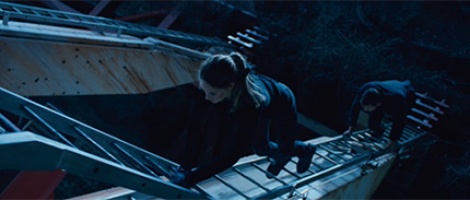
Warning. If you are afraid of a “spoiler alert” related to a Batman movie this post might disturb you. But you’ll probably be OK. We don’t go to Batman movies to be surprised. We go to see someone re-imagine a very familiar story. Besides, the trailer gives away some of the best parts!
To be sure, this overlong, best-Batman-in-my-opinion is cleverly re-imagined. It is so beautifully created I wouldn’t have needed a coherent plot, but I got one. The Batman is a couple of years into his nocturnal crime fighting and things don’t always go too well. He is facing an identity crisis in the daylight as Bruce Wayne (but don’t expect too much daylight in this dark movie), and more crisis in the nighttime as “Vengeance” personified. Everyone is corrupted by wicked elements that threaten to drown (and then actually drown) Gotham City, past and present. The millennial Batman is not sure he is making a difference. And he is sad, mad, and afraid he is turning bad: “They think I’m hiding in the shadows,” he intones in an opening voiceover. “But I am the shadows.”
Post-traumatic growth
The movie is not another origin story; it assumes we know The Batman’s parents were murdered in front of his eyes. His iconic trauma lives on. The Batman has reinforced it by reliving it night after night and attempting to relieve it by wrecking vengeance on anyone who would dominate the good people of Gotham, like his parents were.
So far, his fury does not seem to be making a big difference on the streets. But it takes a toll on The Batman’s scarred body; it undermines the Wayne business empire; and it makes having a relationship with The Catwoman difficult. The movie does not dig into this toll deeply, even though it is three hours long. More time is taken up by chases using the first-generation Batcycle and Batmobile and by splendidly choreographed fight scenes in which the hero uses prototypes of what will become Batman’s famous collection of gear.
The Batman is quick to learn about crime fighting, but he is slower to learn about his trauma. I wondered if the script writers had consulted a book I assigned a class a couple of years ago called The Post-traumatic Growth Workbook. The film reflects the increased awareness people have gained in the last ten years about how trauma can shape us. Some people end up perpetual victims and may even victimize others. But some people use their trauma to become more resilient and hopeful. (Most people land in between). The workbook (which you can use yourself, it is not just for professionals) assumes everyone can be positively transformed by trauma. By the end of the movie, The Batman seems to be validating that hope. In service to that theme, the movie is too short, since it often takes a long time for people to uncover and explore their trauma and find a way out of it and into new patterns of feeling, thinking and behaving.

The inner Batboy
The search for mental health often starts on the outside and works its way into our hearts, a lot like God coming to find us and rescue us in Jesus. Jesus pops up here and there in the movie, but the “caped crusader” is saved from saving himself by a trinity of important people: the likewise-traumatized Catwoman, the injured Alfred, and the newly-fatherless son of the assassinated mayor.
- Catwoman begins to undo his steely isolation — “Maybe we’re not so different. Who are you under there?…Are you just hideously scarred?” (He grimly answers, “Yes.”)
- The threat of losing his surrogate father reminds him how he has been loved by Alfred and offered the attachment he lost; some bat-tears even well up. – “You needed a father. All you had was me.”
- But it is the speechless boy the filmmakers make sure you don’t miss. On three occasions time stops; The Batman and the boy lock eyes and make a mysterious connection. Some people say this is Robin-in-the-making. Maybe.
Someone told me a much better idea than Robin, since they experienced Bruce Wayne’s revelation vicariously while they watched the film. This lost boy, who Batman rescues twice, is the image of the batboy suffering within The Batman. As he rescues the boy he is rescuing himself. As he attends to and attaches to this boy, he is attending to his own wounded soul. You can usefully watch the whole movie through this lens. (Even the parts Colin Farrell steals as the Penguin). Try it!
My friend’s moment of truth centered on the scene when the The Batman tries to rescue the new mayor, who understandably, in her traumatized state, is reluctant to take his hand. To our surprise, another hand rises from behind the wreckage. It is the former mayor’s son reaching out. The boy slowly comes into the camera’s view and his formerly unreachable, new friend pulls him from the wreckage. That might be the adult you reaching back to care for that poor orphaned you still stuck in the wreckage of the past. It is certainly the Spirit of God in us overriding our personal rules of life to free us from our victimhood and welcome even the abused parts of us into their dignity and transformation.
The final scenes of mayhem are probably worth the admission price for most of us. But I reveled in watching The Batman assisting in the final cleanup that followed. In the process of cleaning up, he gets cleaned up. The sun rises after a night full of horror and he is out in his mud covered, designed-for-the-dark uniform helping the injured into helicopter stretchers. One youngster won’t let him go, which would probably soften your hardened heart, too.
The movie is not all tidied up at the end, or how could there be sequel (which would be the 14th live-action rendition, and that does not include Lego movies)? The messiness makes it a great movie for the mud-spattered spring of 2022. Many of us feel a post-Covid fear of being stuck in the mud as we watch Russian trucks running on fumes through muck-season in Ukraine. Will we ever get out of feeling victimized by our trauma, newly-experienced and triggered every day? Getting used to the dawn, The Batman realizes, “Vengeance won’t change the past. Mine or anyone else’s. People need hope.”


 Rep. Alexandria Ocasio-Cortez (D-NY)
Rep. Alexandria Ocasio-Cortez (D-NY) 
 Don’t gasp, act
Don’t gasp, act










